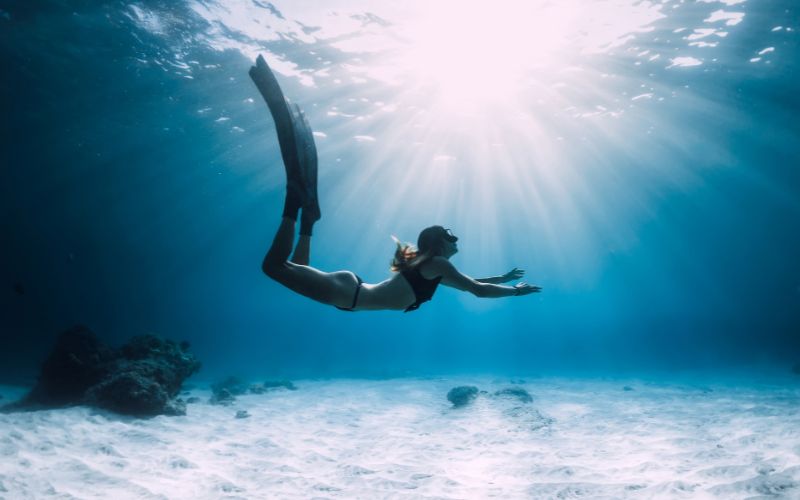No matter how experienced of a diver you are, one thing is for certain – at some point, you’ve wondered about how long you can hold your breath for.
After all, free diving is all about going deep into the water without any tanks or oxygen.
So naturally, the big question is – just how long can our bodies endure being underwater before we start to experience some serious consequences?
The average person can hold their breath for anywhere from 30 seconds to 2 minutes. Of course, this depends on a few different factors, such as how healthy you are, your level of activity, and even how scared you are (being scared will cause you to breathe more rapidly).
Table of Contents
The average amount of time
Two minutes is still a pretty good amount of time to be holding your breath for.
After all, most free dives only last around 1 minute and 30 seconds – so you’ve got some wiggle room.
Just remember that the deeper you go, the more quickly your oxygen will be depleted. So don’t push yourself too hard.
How long can a human being comfortably hold their breath for?
The average person can hold their breath for around 30 to 60 seconds.
This number increases if you are in good shape and have strong lungs. However, even the fittest and strongest among us will start to feel discomfort after 60 seconds underwater.
Free divers, on the other hand, can hold their breath for much longer periods of time.
The current world record is held by German free diver Werner Gniewek who held his breath for 22 minutes and 22 seconds.
What factors affect how long you can hold your breath?
There are several factors that affect how long you can hold your breath.
These include:
Age- Generally, children can hold their breath longer than adults because their lungs are still growing.
As we age, our lung capacity decreases which means we can’t hold our breath for as long.
Health- If you have a lung condition or smoking affects your lungs, then you won’t be able to hold your breath for as long as someone who doesn’t have these issues.
Anxiety Levels- If you’re anxious, your heart rate will increase and you will start to breathe faster.
This depletes the oxygen in your blood which means you will need to breathe sooner.
Training- If you train regularly, you will be able to increase your lung capacity and control which means you can hold your breath for longer periods of time.
What happens if I hold my breath for too long?
If you hold your breath for too long, you may start to experience hypoxia – which is when your brain isn’t getting enough oxygen.
This can cause tingling in your extremities, lightheadedness, tunnel vision, and even loss of consciousness.
In severe cases, it can even lead to permanent brain damage or death.
Of course, every person is different.
Some people may be able to hold their breath for 4 minutes without experiencing any symptoms of hypoxia while others may start feeling it after just 60 seconds.
It really varies from person to person.
How do free divers do it?
The answer lies in training and preparation.
Free diving is an extreme sport and, like all extreme sports, it comes with its fair share of risks.
In order to minimize these risks, free divers undergo rigorous training both in the water and out.
They learn specialized breathing techniques that help them slow their heart rate and maximize the amount of oxygen in their bloodstream.
They also practice holding their breath in progressively longer intervals so that their bodies become accustomed to going without oxygen for extended periods of time.
Beginner divers
If you’re just starting out, it’s important to remember that you won’t be able to hold your breath for as long as more experienced divers.
As a beginner, you can expect to stay underwater for around 20-30 seconds on a single breath.
Of course, this will also depend on how much air you take in before diving and how cold the water is.
In general, though, 20-30 seconds is a good estimate for beginner divers.
Intermediate divers
As you become more comfortable with free diving and build up your lung capacity, you’ll be able to hold your breath for longer periods of time.
Intermediate divers can usually stay underwater for 1-2 minutes on a single breath.
Again, this will vary depending on factors like air intake and water temperature, but 1-2 minutes is a good estimate for intermediate divers.
Advanced divers
Once you’ve really mastered the art of free diving and built up a sizable lung capacity, you’ll be able to stay underwater for extended periods of time— sometimes even up to 5 minutes.
Of course, this is only possible if you’re taking big breaths and the water is relatively warm.
But if all those conditions are met, advanced divers can stay underwater for quite a while on a single breath.
Final Words
s you can see, how long you can stay underwater on a single breath depends on several factors— namely, your level of experience, your lung capacity, and the water temperature.
In general, beginner divers can stay underwater for 20-30 seconds, intermediate divers can stay underwater for 1-2 minutes, and advanced divers can stay underwater for up to 5 minutes.
However, it’s important to keep in mind that these are just estimates; everyone is different and everyone’s body will react differently when they’re submerged in water.
As a general rule of thumb, it’s best not to push yourself too hard when it comes to holding your breath underwater.
The average person can hold their breath for up to 2 minutes – but remember that this number will decrease the deeper you go.
If you start to experience any symptoms of hypoxia such as lightheadedness or tingling in your extremities, it’s time to surface as soon as possible.





